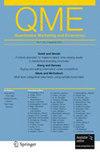Search query formation by strategic consumers
IF 1.1
4区 管理学
Q3 BUSINESS
引用次数: 5
Abstract
Submitting queries to search engines has become a major way for consumers to search for information and products. The massive amount of search query data available today has the potential to provide valuable information on consumer preferences. In order to unlock this potential, it is necessary to understand how consumers translate their preferences into search queries. Strategic consumers should attempt to maximize the information content of the search results, conditional on a set of beliefs on how the search engine operates. We show using field data that optimal queries may exclude some of the terms that are more relevant to the consumer, potentially at the expense of less relevant terms. In two incentive-aligned lab experiments, we find that consumers have some ability to strategically omit relevant terms when forming their search queries, but that their search queries tend to be suboptimal. In a third incentive-aligned experiment, we find that consumers’ beliefs on how the search engine operates tend to be inaccurate. Overall, our results are consistent with consumers being strategic when formulating their queries, but acting on incorrect beliefs on how the search engine operates.搜索由战略消费者形成的查询
向搜索引擎提交查询已成为消费者搜索信息和产品的主要方式。目前可用的大量搜索查询数据有可能提供有关消费者偏好的宝贵信息。为了释放这种潜力,有必要了解消费者如何将他们的偏好转化为搜索查询。战略消费者应该尝试最大限度地提高搜索结果的信息含量,条件是对搜索引擎的运行方式有一套信念。我们使用字段数据表明,最佳查询可能会排除一些与消费者更相关的术语,这可能会以牺牲不太相关的术语为代价。在两个与激励一致的实验室实验中,我们发现消费者在形成搜索查询时有一定的能力战略性地省略相关术语,但他们的搜索查询往往是次优的。在第三个与激励一致的实验中,我们发现消费者对搜索引擎运行方式的看法往往是不准确的。总的来说,我们的结果与消费者在制定查询时的策略一致,但他们对搜索引擎的运行方式有错误的看法。
本文章由计算机程序翻译,如有差异,请以英文原文为准。
求助全文
约1分钟内获得全文
求助全文
来源期刊

Qme-Quantitative Marketing and Economics
Multiple-
CiteScore
2.30
自引率
10.50%
发文量
13
期刊介绍:
Quantitative Marketing and Economics (QME) publishes research in the intersection of Marketing, Economics and Statistics. Our focus is on important applied problems of relevance to marketing using a quantitative approach. We define marketing broadly as the study of the interface between firms, competitors and consumers. This includes but is not limited to consumer preferences, consumer demand and decision-making, strategic interaction of firms, pricing, promotion, targeting, product design/positioning, and channel issues. We embrace a wide variety of research methods including applied economic theory, econometrics and statistical methods. Empirical research using primary, secondary or experimental data is also encouraged. Officially cited as: Quant Mark Econ
 求助内容:
求助内容: 应助结果提醒方式:
应助结果提醒方式:


